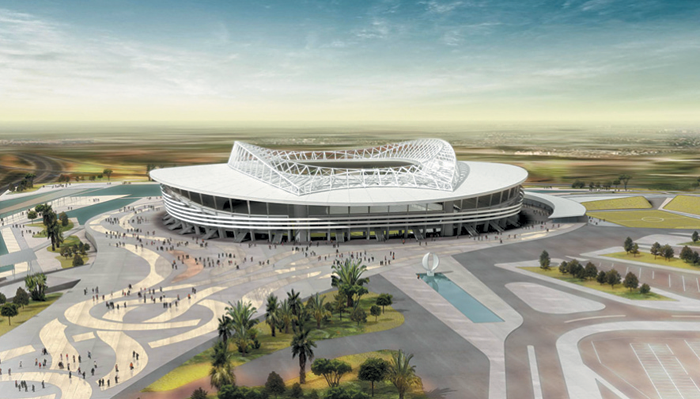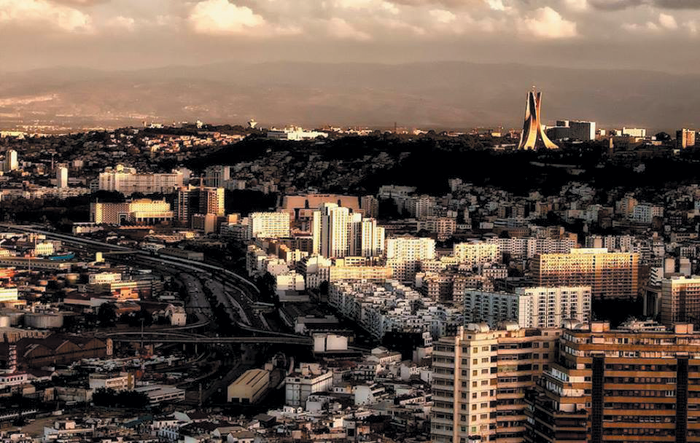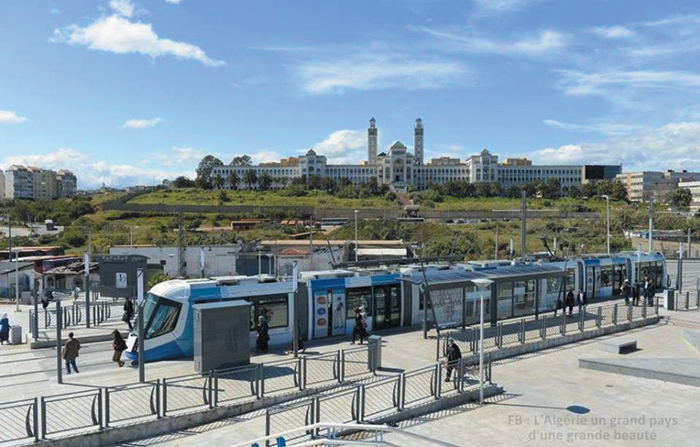Algeria, a country of opportunities
Algeria continues its determined and rapid strides towards economic and social development. It emerges as a stable and durable investment pole, consolidating its attractiveness with unequalled investment opportunities in the region and beyond, and a consistently improved business climate.
Despite the current international economic conjuncture, the country’s financial indicators show a stable situation allowing the Algerian Government to pursue easily the 3rd five year development program for the period 2015 - 2019. GDP is expected to grow by an average rate of 7% during the period.

This solid financial and economic basis has been ensured by a prudential approach based on three main instruments. First, under the leadership of H.E.M Abelaziz Bouteflika, the country has been completely freed from the burden of external debt. Since 2006, Algeria’s external debt has been brought down to a negligible level. Secondly, important external reserves have been cumulated during the high conjuncture on the international oil market, amounting to 179 billion USD at the end of 2014, coupled with consistent budgetary savings allowed by the creation of a mechanism called stabilization fund (FRR) with the function to receive budget surplus. These instruments will be completed during the coming years by a policy of budgetary rationalization, which will redirect to the financial market all the projects that can be classified as commercial.
The 2015 ? 2019 investment program totals 280 billion USD. It will benefit in priority to the sectors of transports, housing, education, water resources, and energy, with the aim to improve the living conditions of the population and to enhance the factors of competitiveness of the economy.
In fact, the program completes a strategy being implemented more than ten years ago. It will cover new projects as well as projects that have been started under the previous program. In the infrastructures’ sector, the highway network extension will be continued with the launch of the Central highlands Highway. The railway network modernisation and extension, the development of urban transports (subway, tram...) as well as the renovation of the ports infrastructures are equally at the menu. Investments in the water resources sector, which have a strategic character, will also be carried on adding to the amount of almost 40 billion USD invested since 2001, transforming literally the image of the country. Finally, the nationwide optic fibre telecommunications network will be completed, allowing to connect every single agglomeration of more than 1000 persons. The aim is to insert Algeria to the knowledge economy and to reinforce the ICT sector.

The housing sector remains a strategic priority. The new program envisages the construction of 1.6 million new houses which will be added to the 1.2 million ones currently being constructed, under the 2010 - 2014 program, in the framework of the policy of improvement of the urbanism and living conditions of the population. This effort will allow in the short term to definitively resolving the housing issue.
Other important priority: energy. The aim is to cover the domestic needs of a country growing very fast and to maintain its position as a key supplier on the international oil and gas market. The Government action plan in this sector includes the intensification of oil exploration and development in order to renew the national reserves and to assess the non-conventional hydrocarbons potential.
In 2013-2014, more than a billion tonnes of oil equivalent have been registered, what constitutes a record for the national company Sonatrach. This effort will be maintained because Algeria is still relatively under-explored. Almost a third of the country’s territory is still completely virgin.
The second aspect of the energy policy is the valorization of the production. To that end, five new refineries will be constructed which will allow to double the national refining capacities in the horizon 2020.
Other key targets of the Algerian authorities in the energy sector are to double the electricity production capacities in 2017, and to double the production of gas in 2020.
Concerning the petrochemical industry, several important projects have been launched with a cumulated value of 20 billion USD. These projects include the construction of a plastic producing industrial complex of international calibre in Skikda (at the Eastern coast of Algeria).
The renewable energy program is at the heart of the Algerian Government economic and energy policies. The public authorities plan to double the renewable energy production of the previous program (2010 - 2014). Production capacities of 22.000 megawatt are projected in the horizon 2030 (solar, wind, biomass...). This will represent more than 25% of the total of the country’s energy production. Until 2020, 5.000 megawatts will be made available, and this year 20 solar power plants will start operating with a total capacity of 400 megawatt.
The impact of this program in terms of job creation, industrialization, technological development and skills acquisition will be very important. Its implementation offer to domestic as well as foreign investors huge opportunities.

The objectives of the Algerian authorities go well beyond infrastructures and energy sectors. The ultimate goal is to diversify the national economic basis and to expand the productive activities, especially the export industries. The process is already well engaged. It is worth to note, in this regard, that the weakness of the Algerian economy is not its dependency to the oil sector per se; this sector represents only 30% of the GDP, but the importance of the share of this sector as the main source of foreign currency.
To address this strategic challenge, the Algerian Government has defined a new industrial vision and strategy based on the development of twelve key sectors: textile and leather, natural resources development industries, electrical and electronic industries, chemical industry, pharmaceuticals, mechanics, agro-industry, automobile, industrial vehicles and transport systems, shipbuilding and repair, aerospace and digital industries. The participation of foreign (korean) companies, as long-term partners and, more importantly, as providers of technology and know-how, is a key factor for the success of this strategy.
This profusion of sectors and business opportunities is even more interesting that Algeria has strengthened its attractiveness as a regional investment pole during the recent period. According to the 2014 report of the World Economic Forum, Algeria moved up 30 places in the world competitiveness ranking in the last two years, from the 110th in 2012 to 79th rank in 2014. The 2014 edition of the "Financial Times" report on productive foreign direct investment (FDI), confirms the same this reality. Algeria ranks as the 4th largest investment pole in Africa and the first in North Africa.
The impressive business opportunities summarily depicted, added to Algeria’s clear choices in favor of openness to private initiative and global economy, plus its wide range of assets: availability of skilled and cheap labor, low energy input costs, and a strategic geographical location, makes it an exceptionally attractive country in the current difficulties of the world economy.
Facts and figures about Algeria
Algeria (Arabic: Aldjazair, Tamazight: Dzayer), officially the Democratic Republic of Algeria. It is the largest country bordering the Mediterranean and in Africa.
Capital city Algiers.
Flag
Green and white background, symbols of heaven and peace, with a red crescent and star at the center. The red color represents the blood of the Martyrs for the independence of the country. The crescent and star represents the symbols of Islam.
Head of state
H.E.M Abdelaziz Bouteflika. Elected in April 1999, re-elected in April 2004, April 2009 and April 2014).
Government
Presidential system.
Location
North Africa, part of the Maghreb. It is bordered in the North by the Mediterranean Sea. It shares land borders with Tunisia (east), Libya (south-east), Niger, Mali, Mauritania (south), Western Sahara (south West), and Morocco (West).
Area: km² 2,381,741. Algeria is the largest country in the Mediterranean and the African continent.
48 wilayas (provinces)
The most important are: Algiers, Oran, annaba, Constantine, Telemcen, Ourgla, Tamanrasset.
Population
40 million inhabitants (January 2014 estimate). Almost half of the population within 20 years.
Religion
Sunni Islam.
Languages
Arabic (official), and Thamazight (National).
National day
November 1st, commemorating the outbreak of the Algerian revolution against French colonizer in 1954, which led to the independence of the country in July, 5th, 1962.
GDP
206 billion USD 2014.
GDP per capita: 5,474USD (2014)
Currency
Algerian dinar (DZD). (1$ = 110 DZD)
Affiliation
Algeria is a member of the United Nations (UN), the African Union (AU) and the League of Arab States. It joined the OPEC (OPEC) in 1969. In February 1989, Algeria has participated with the other Maghreb states, to the creation of the Union of the Arab Maghreb (AMU).
Sites registered in UNESCO World Heritage
The Beni Hammad Fort (1980); Djemila (1982); Tassili n'Ajjer (1982); Timgad (1982); Tipasa (1982); the M'Zab Valley (1982); the Casbah of Algiers (1992).

